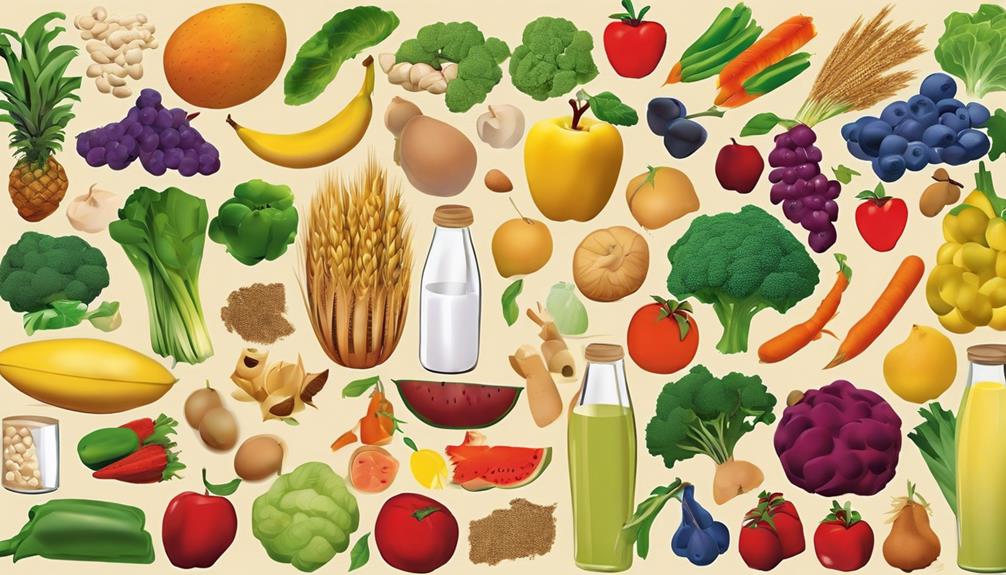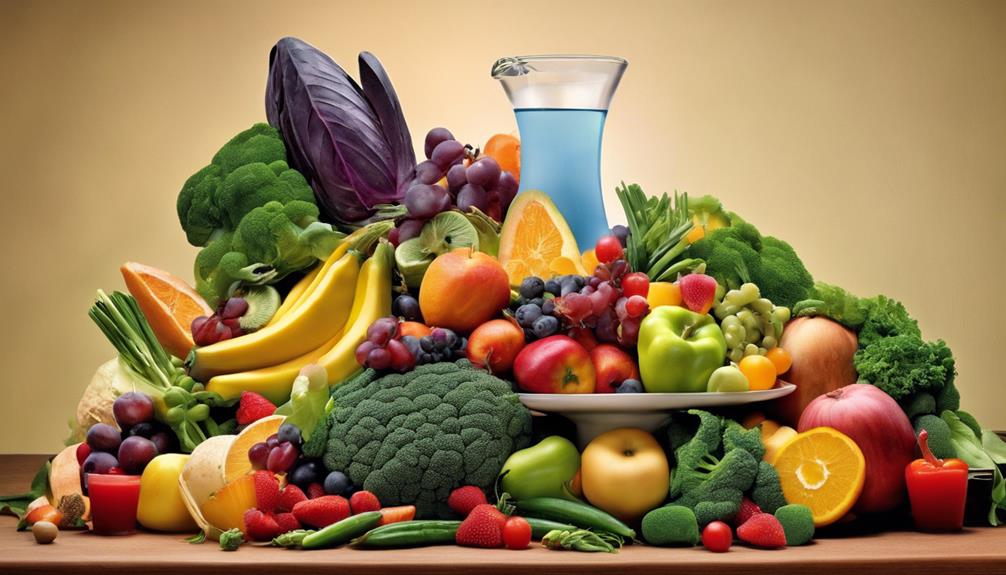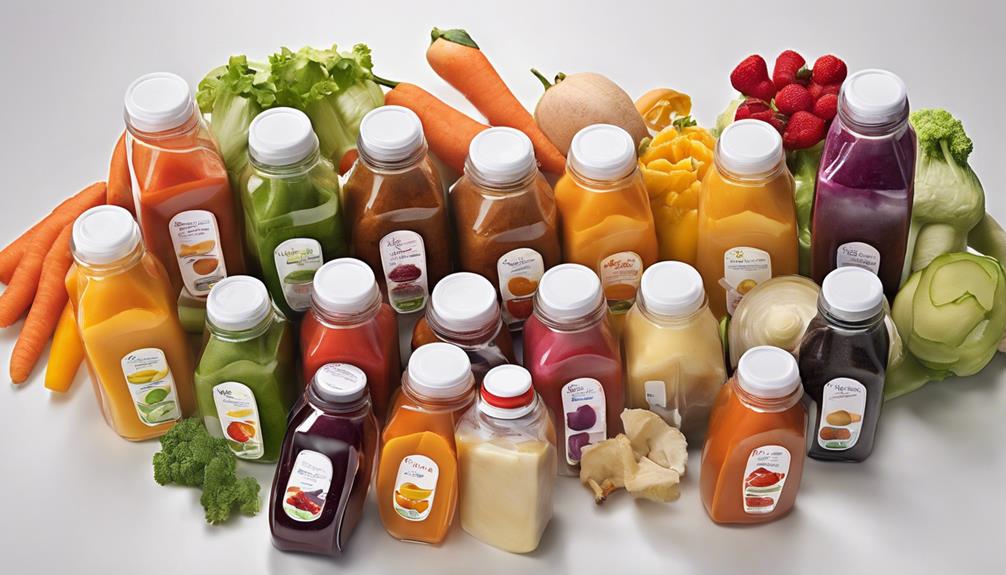Ensuring a well-rounded diet while breastfeeding is critical for maintaining both our health and that of our little ones. The nutrients we consume play an essential role in fostering the best growth and development, not just for our babies but also for our own bodies.
But what specific components make this balance so important?
Key Takeaways
- Supports healthy development in babies through nutrient-rich breast milk.
- Provides energy for milk production and maintains a healthy milk supply.
- Promotes postpartum recovery, mental health, and immune system strength.
- Enhances the nutritional content and quality of breast milk for the baby's benefit.

Legendairy Milk Liquid Gold Lactation Support | Lactation Supplement with Organic Goats Rue, Milk Thistle, Shatavari, Fennel, Alfalfa & Anise | Breastfeeding Supplements, 60 Count
𝐒𝐓𝐄𝐏 𝐔𝐏 𝐘𝐎𝐔𝐑 𝐋𝐀𝐂𝐓𝐀𝐓𝐈𝐎𝐍 𝐆𝐀𝐌𝐄 – Liquid Gold is a powerful blend of 6 certified organic ingredients well-known…
As an affiliate, we earn on qualifying purchases.
As an affiliate, we earn on qualifying purchases.
Nutrient-Rich Diet for Baby's Development
Ensuring a nutrient-rich diet is essential for supporting the healthy development of a breastfeeding baby. A mother's diet plays an important role in providing the necessary nutrients for her baby through breast milk. Consuming a variety of healthy foods is key to meeting the baby's nutritional needs during this critical period. Nutrient-rich foods such as fruits, vegetables, whole grains, lean proteins, and dairy products are key components of a balanced diet for breastfeeding mothers.
These foods are rich in essential vitamins like vitamin A, vitamin C, and vitamin D, as well as important minerals such as calcium and iron. These nutrients are passed on to the baby through breast milk, supporting their growth and overall health. Adequate intake of protein from sources like lean meat, poultry, fish, legumes, and nuts is also important for the baby's development. Additionally, ensuring a sufficient intake of calcium is important for bone development and overall growth in the baby.

MaryRuth Organics Prenatal Vitamins for Women | USDA Organic Prenatal Gummies | Postnatal Vitamins for Women Breastfeeding | Methylfolate 800 mcg DFE | Iodine | Vegan | Non GMO | 30 Servings
Organic Prenatal Vitamins for Women: Pregnant and postpartum bodies undergo significant physical and hormonal changes, often requiring additional…
As an affiliate, we earn on qualifying purchases.
As an affiliate, we earn on qualifying purchases.
Energy and Milk Production

A balanced diet during breastfeeding is important for providing the energy required for milk production. Nutrient-rich foods play a critical role in supporting the high demands of lactation and help in maintaining a healthy milk supply for the baby. By consuming a variety of foods, breastfeeding mothers can guarantee that the breast milk produced is rich in essential vitamins and minerals necessary for the baby's growth and development.
Proper nutrition not only aids in meeting the increased energy needs of lactating mothers but also promotes overall health during the breastfeeding period. Inadequate dietary intake can have a direct impact on milk production and quality, potentially affecting the baby's nutrition. Incorporating a well-balanced diet that includes a mix of fruits, vegetables, whole grains, lean proteins, and dairy products is essential for sustaining milk production and ensuring the well-being of both the mother and the baby.

Boobie Bar Superfood Lactation Bar Variety Pack, Lactation Snacks for Breastfeeding Moms to Increase Milk Supply, Fenugreek-Free, Gluten-Free, Dairy-Free, Vegan (18 Bars, 3 Flavors)
MILK-BOOSTING LACTATION BARS – Our Milk to the Max Bars are expertly formulated to increase milk supply with…
As an affiliate, we earn on qualifying purchases.
As an affiliate, we earn on qualifying purchases.
Maternal Health Benefits
Supporting maternal health through a balanced diet during breastfeeding is essential for promoting postpartum recovery and sustaining energy levels. Ensuring adequate nutrition not only benefits the mother but also positively impacts the quality of breast milk and the overall health of the infant.
Here are three ways a balanced diet can benefit maternal health during breastfeeding:
- Preventing Postpartum Depression: Nutrient-rich foods can play a critical role in preventing postpartum depression, providing mothers with the emotional support they need during this critical time.
- Supporting Mental Health: A balanced diet can support mental health by supplying essential nutrients that help regulate mood and reduce stress levels, promoting overall well-being.
- Boosting Immune System: Proper nutrition enhances the mother's immune system, helping her fend off illnesses and infections, which is particularly important during the postpartum period when the body is in recovery mode.

Pink Stork Total Postnatal Vitamins for Women | Vegan DHA, Iron, Folate, B12 | Postpartum Recovery Essentials | Lactation Support for Breastfeeding Moms | Third-Party Tested – 60 Capsules, Berry
POSTNATAL MULTIVITAMIN: OBGYNs recommend a postnatal multivitamin for at least six months postpartum. Pink Stork Total Postnatal Vitamin…
As an affiliate, we earn on qualifying purchases.
As an affiliate, we earn on qualifying purchases.
Improved Milk Composition

Improving the nutritional content of breast milk through a balanced diet is important for supporting the growth and development of the infant. Consuming a variety of nutrient-rich foods rich in essential nutrients such as vitamins, minerals, and proteins can positively impact the quality of breast milk.
By making wise dietary choices, breastfeeding mothers can enhance the nutritional value of their milk, ensuring that their baby receives all the necessary components for best growth. Research indicates that a well-balanced diet during breastfeeding can lead to increased levels of beneficial elements like antibodies and immune-boosting factors in breast milk.
This highlights the importance of maintaining a healthy and diverse diet to improve the composition of breast milk. Focusing on a nutrient-dense and balanced diet is key to providing the best possible nutrition for the baby through breastfeeding.
Postpartum Recovery Support
Providing thorough postpartum recovery assistance is essential for aiding mothers in their physical and emotional healing after childbirth. This support plays a vital role in promoting the well-being and comfort of mothers during the postpartum period.
Here are three essential components of postpartum recovery support:
- Breastfeeding Guidance: Proper assistance and education on breastfeeding techniques can help mothers establish a successful breastfeeding routine, ensuring the best health of both the mother and the infant.
- Nutritional Support: Offering advice on nutrition postpartum is vital for replenishing the body with essential nutrients depleted during childbirth, fostering faster recovery, and supporting overall well-being.
- Self-Care Strategies: Encouraging mothers to prioritize self-care practices, such as rest, relaxation, and engaging in activities they enjoy, is key to promoting emotional healing and reducing the risk of postpartum depression.
Frequently Asked Questions
Why a Healthy Diet Is Important in Breastfeeding?
Eating a healthy diet while breastfeeding is vital. It guarantees we provide essential nutrients for our health and quality breast milk production. Nutrient-rich foods support our baby's growth. Hydration and regular meals maintain energy levels.
Why Is Nutrition Important for Breastfeeding Mothers?
We prioritize nutrition for breastfeeding mothers to guarantee top health for both mom and baby. A balanced diet provides essential nutrients, supports energy levels, and aids in postpartum recovery. Our well-being and development depend on it.
What Is Important in the Diet of Breastfeed Mothers?
In our diet as breastfeeding mothers, focusing on nutrient-rich foods like protein, calcium, iron, and vitamins is essential. Hydration and energy levels are key for milk production. Consulting healthcare providers guarantees meeting both our and our babies' needs effectively.
What Are Dietary Needs When Breastfeeding?
We require additional nutrients like protein, calcium, iron, iodine, and vitamins to support milk production. Varied meals guarantee we get all necessary nutrients. Adequate hydration is important for maintaining milk supply and overall health. Consulting a healthcare provider can determine specific dietary needs for best breastfeeding.
Conclusion
As breastfeeding mothers, let's remember that a balanced diet is our secret weapon, like a nourishing shield protecting both ourselves and our little ones.
By fueling our bodies with nutrient-rich foods, we not only support our babies' growth and development but also boost our own well-being and postpartum recovery.
Let's embrace the power of a healthy diet to give our babies the best start in life through the gift of breast milk.









